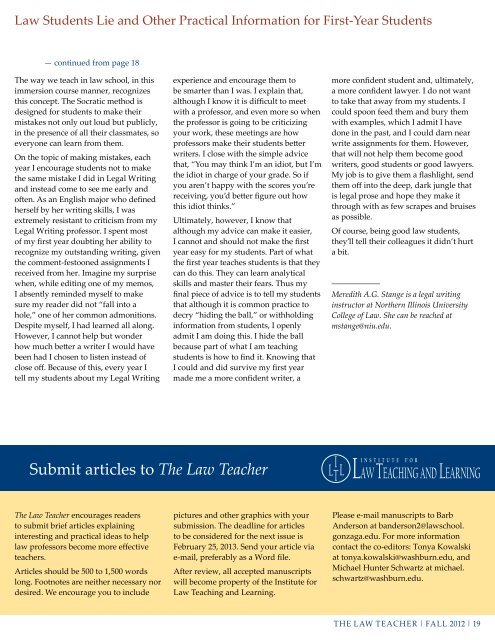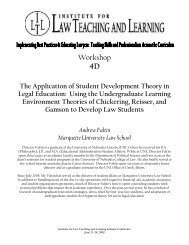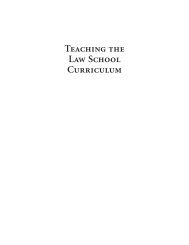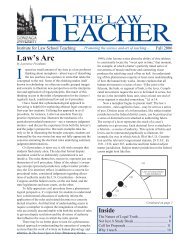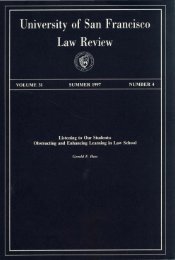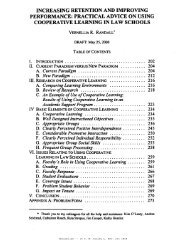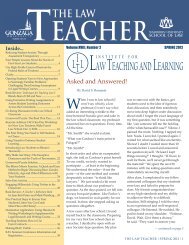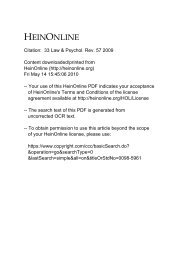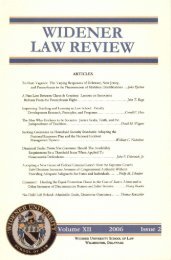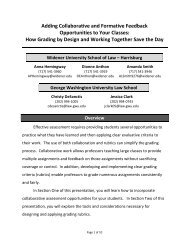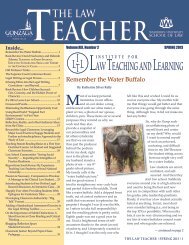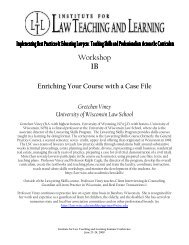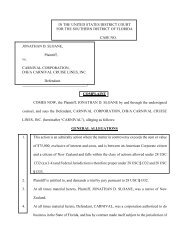The Law Teacher - Institute for Law Teaching and Learning
The Law Teacher - Institute for Law Teaching and Learning
The Law Teacher - Institute for Law Teaching and Learning
Create successful ePaper yourself
Turn your PDF publications into a flip-book with our unique Google optimized e-Paper software.
<strong>Law</strong> Students Lie <strong>and</strong> Other Practical In<strong>for</strong>mation <strong>for</strong> First-Year Students<br />
— continued from page 18<br />
<strong>The</strong> way we teach in law school, in this<br />
immersion course manner, recognizes<br />
this concept. <strong>The</strong> Socratic method is<br />
designed <strong>for</strong> students to make their<br />
mistakes not only out loud but publicly,<br />
in the presence of all their classmates, so<br />
everyone can learn from them.<br />
On the topic of making mistakes, each<br />
year I encourage students not to make<br />
the same mistake I did in Legal writing<br />
<strong>and</strong> instead come to see me early <strong>and</strong><br />
often. As an English major who defined<br />
herself by her writing skills, I was<br />
extremely resistant to criticism from my<br />
Legal writing professor. I spent most<br />
of my first year doubting her ability to<br />
recognize my outst<strong>and</strong>ing writing, given<br />
the comment-festooned assignments I<br />
received from her. Imagine my surprise<br />
when, while editing one of my memos,<br />
I absently reminded myself to make<br />
sure my reader did not “fall into a<br />
hole,” one of her common admonitions.<br />
Despite myself, I had learned all along.<br />
however, I cannot help but wonder<br />
how much better a writer I would have<br />
been had I chosen to listen instead of<br />
close off. Because of this, every year I<br />
tell my students about my Legal writing<br />
experience <strong>and</strong> encourage them to<br />
be smarter than I was. I explain that,<br />
although I know it is difficult to meet<br />
with a professor, <strong>and</strong> even more so when<br />
the professor is going to be criticizing<br />
your work, these meetings are how<br />
professors make their students better<br />
writers. I close with the simple advice<br />
that, “You may think I’m an idiot, but I’m<br />
the idiot in charge of your grade. So if<br />
you aren’t happy with the scores you’re<br />
receiving, you’d better figure out how<br />
this idiot thinks.”<br />
Ultimately, however, I know that<br />
although my advice can make it easier,<br />
I cannot <strong>and</strong> should not make the first<br />
year easy <strong>for</strong> my students. Part of what<br />
the first year teaches students is that they<br />
can do this. <strong>The</strong>y can learn analytical<br />
skills <strong>and</strong> master their fears. Thus my<br />
final piece of advice is to tell my students<br />
that although it is common practice to<br />
decry “hiding the ball,” or withholding<br />
in<strong>for</strong>mation from students, I openly<br />
admit I am doing this. I hide the ball<br />
because part of what I am teaching<br />
students is how to find it. Knowing that<br />
I could <strong>and</strong> did survive my first year<br />
made me a more confident writer, a<br />
Submit articles to <strong>The</strong> <strong>Law</strong> <strong>Teacher</strong><br />
<strong>The</strong> <strong>Law</strong> <strong>Teacher</strong> encourages readers<br />
to submit brief articles explaining<br />
interesting <strong>and</strong> practical ideas to help<br />
law professors become more effective<br />
teachers.<br />
articles should be 500 to 1,500 words<br />
long. Footnotes are neither necessary nor<br />
desired. we encourage you to include<br />
pictures <strong>and</strong> other graphics with your<br />
submission. <strong>The</strong> deadline <strong>for</strong> articles<br />
to be considered <strong>for</strong> the next issue is<br />
February 25, 2013. Send your article via<br />
e-mail, preferably as a Word file.<br />
after review, all accepted manuscripts<br />
will become property of the <strong>Institute</strong> <strong>for</strong><br />
<strong>Law</strong> <strong>Teaching</strong> <strong>and</strong> <strong>Learning</strong>.<br />
more confident student <strong>and</strong>, ultimately,<br />
a more confident lawyer. I do not want<br />
to take that away from my students. I<br />
could spoon feed them <strong>and</strong> bury them<br />
with examples, which I admit I have<br />
done in the past, <strong>and</strong> I could darn near<br />
write assignments <strong>for</strong> them. however,<br />
that will not help them become good<br />
writers, good students or good lawyers.<br />
My job is to give them a flashlight, send<br />
them off into the deep, dark jungle that<br />
is legal prose <strong>and</strong> hope they make it<br />
through with as few scrapes <strong>and</strong> bruises<br />
as possible.<br />
Of course, being good law students,<br />
they’ll tell their colleagues it didn’t hurt<br />
a bit.<br />
____________<br />
Meredith A.G. Stange is a legal writing<br />
instructor at Northern Illinois University<br />
College of <strong>Law</strong>. She can be reached at<br />
mstange@niu.edu.<br />
Please e-mail manuscripts to Barb<br />
<strong>and</strong>erson at b<strong>and</strong>erson2@lawschool.<br />
gonzaga.edu. For more in<strong>for</strong>mation<br />
contact the co-editors: Tonya Kowalski<br />
at tonya.kowalski@washburn.edu, <strong>and</strong><br />
Michael Hunter Schwartz at michael.<br />
schwartz@washburn.edu.<br />
<strong>The</strong> <strong>Law</strong> <strong>Teacher</strong> | FaLL 2012 | 19


